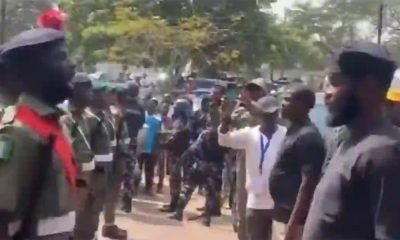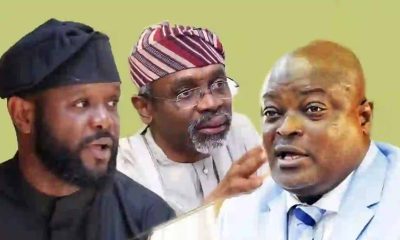Politics
Seyi Tinubu death threat: Court fixes Jan 6 on Olamide bail application
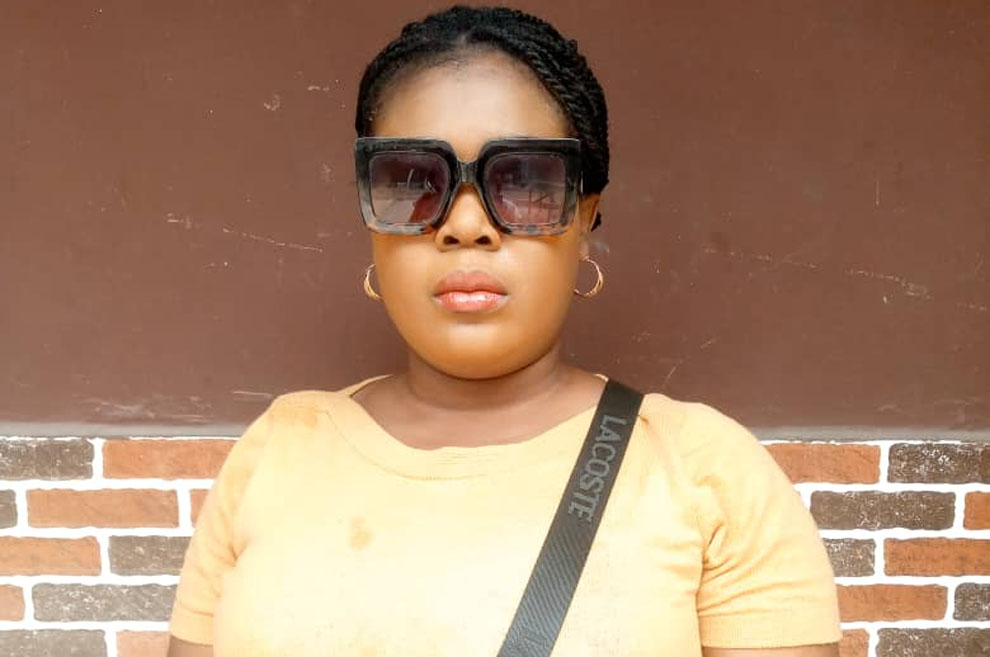
Seyi Tinubu death threat: Court fixes Jan 6 on Olamide bail application
A Federal High Court in Abuja on Tuesday, fixed Jan. 6, for ruling in a bail application filed by Olamide Thomas, who allegedly threatened Seyi Tinubu with death threat on social media.
Justice Emeka Nwite fixed the date after T.J. Aondo, who appeared for Thomas, and the lawyer to the prosecution, Victor Okoye, made their submissions for and against the bail application.
Upon resumed hearing, Okoye told the court that the matter was slated for the hearing of the bail application and that he had filed and served his counter affidavit on the applicant’s lawyer.
Moving the bail motion, Aondo said the application, dated Dec. 20, was served on same date.
He said it was brought pursuant to the 1999 Constitution and Administration of Criminal Justice Act (ACJA), 2015.
The lawyer said the application prayed the court for an order admitting Thomas to bail pending the hearing and determination of the charge before the court.
He urged the court to admit his client to bail on liberal terms, assuring that she would not jump bail.
READ ALSO:
- Video: Huge turnout at end-of-year matchmaking event in Lagos
- Police arrest cab driver robbing female passengers in Rivers
- 2025 will usher in full restoration from hardship, says Betta Edu
But Okoye, who said a counter affidavit was filed on Dec. 30, prayed the court to refuse Thomas bail application.
Okoye equally urged the court to discountenance the exhibits attached to the bail request.
He argued that the documents were extracted from the internet in contradiction with Section 84 of the Evidence Act.
He further argued that any newspaper publication sought to be rendered in court ought to be certified by the National Library.
“We submit that those printouts are not worth admitting as evidence,” he said.
Okoye also argued that Thomas claimed that she was suffering from an ailment without attaching any medical report.
He urged the court to discountenance the submission.
But Aondo interjected, arguing that Okoye cannot orally speak on Thomas ill-health, having failed to state this in their counter affifavit.
The senior lawyer also argued that the entire affidavit filed by the prosecution did not meet the requirements of Section 115 of the Evidence Act.
He cited Paragraph 17 of the affidavit which he said equally fell short of Section 115 of Evidence Act.
He said the prosecution argument cannot stop the court from exercising its discretionary power under Section 6(6) of the constitution to grant his client bail.
READ ALSO:
- Lagos teachers returning from audit killed in Ijebu-Ode/Epe road auto crash
- Moscow attacks Ukraine with drones, missiles
- Wanted terrorist commander, Bello Turji, a dead man walking – DHQ
He said the power of the court to admit the defendant to bail cannot even be premised on her production of medical report, citing Sections 35 and 36 of the 1999 Constitution.
Also citing a Supreme Court decision on the admissibility of newspaper publications, Aondo argued that an affidavit presumed to be on oath is already certified.
He said the prosecution did not raised any issue on whether Thomas will not escape if granted bail.
Aondo, therefore, prayed the court to exercise its discretionary power in favour of Thomas.
Justice Nwite adjourned the matter until Jan. 6, 2025 for ruling.
The judge, who hinted that the case file would be remitted back to the chief judge after the ruling, said his duty as vacation judge would end on the date.
The News Agency of Nigeria (NAN) reports that Thomas was, on Dec. 20, arraigned and remanded at Suleja Correctional Centre after she pleaded not guilty to the three-count charge preferred against her by the Inspector-General (I-G) of Police.
Thomas was arrested on allegations bordering on harassing and threatening Seyi Tinubu; the I-G, Kayode Egbetokun and the Police Public Relations Officer, Muyiwa Adejobi, in a viral social media post
In the charge marked: FHC/ABJ/CR/636/2024 dated and filed on Dec 18 by the police team of lawyers led by A.A. Egwu, Olamide was sued as sole defendant.
READ ALSO:
- Court orders forfeiture of $49,700 linked to former INEC official
- DSS arrests activist Shehu Mahdi over post on French military base
- Tinubu reveals Buhari’s role in commencement of Warri refinery operation
NAN reports that in count one, Olamide was alleged to have, sometime in 2024, knowingly and intentionally transmitted communication in the form of video recording through computer system or network on her social media platforms wherein she made remarks in Yoruba Language.
In the video, she was alleged to have stated “that Mr Seyi Tinubu would die this year, and misfortune and calamity had befallen the Tinubu family, with intent to bully, threaten, harass the person of Mr Seyi Tinubu.”
The communication was said to have placed Seyi in fear of death, violence or bodily harm.
The offence is contrary to and punishable under Section 24 (2) (a) of Cybercrimes (Prohibition, Prevention, Etc.) (Amendment) Act, 2024.
In count two, the defendant was alleged to have intentionally transmitted communication in the form of video recording wherein she made remarks in Yoruba Language to bully, threaten, harass the person of Mr Egbetokun.
The communication was said to have placed Egbetokun in fear of death, violence or bodily harm.
The offence is contrary to and punishable under Section 24 (2) (a) of Cybercrimes (Prohibition, Prevention, Etc.) (Amendment) Act, 2024.
In count three, Olamide was accused of intentionally transmitting or causing the transmission of communication in the form of video recording wherein she made remarks in Yoruba Language, stating that the children of Adejobi would all die before his eyes.
She was quoted to have also said that “he (Adejobi) will bury all his children in a single day, with Intent to bully, threaten, harass the person of Mr. Muyiwa Adejobi.”
The communication was said to have placed Adejobi in fear of death of his loved ones.
The offence is said to be contrary to and punishable under Section 24 (2) (a) of Cybercrimes (Prohibition, Prevention, Etc.) (Amendment) Act, 2024
Seyi Tinubu death threat: Court fixes Jan 6 on Olamide bail application
Politics
CNPP urges opposition to unite against Tinubu’s second term

CNPP urges opposition to unite against Tinubu’s second term
The Conference of Nigeria Political Parties (CNPP) has sounded a warning over the fractured state of Nigeria’s opposition parties, cautioning that their lack of unity could allow President Bola Ahmed Tinubu’s All Progressives Congress (APC) to retain power in the 2027 general elections.
In a statement issued by Comrade James Ezema, the CNPP’s Deputy National Publicity Secretary, the organization expressed fears that Nigeria may drift towards a one-party state if opposition parties fail to align their efforts.
“The opposition parties are currently working at cross-purposes, scheming to undo each other ahead of the 2027 presidential election,” Ezema said. “This lack of unity and focus is detrimental to the democratic process and the future of Nigeria.”
The CNPP also advocated for a rotational presidency, emphasizing the need for each of Nigeria’s six geopolitical zones to have a constitutionally guaranteed turn at the presidency. The group believes such a system would promote fairness and ensure stability.
“The presidency must rotate between the northern and southern regions to ensure equitable representation,” Ezema stated. “This is crucial for the long-term stability of our nation.”
READ ALSO:
- 25-year-old man arrested for allegedly kidnapping minor in Kano
- Protest in Ondo community over plans to impose monarch
- Osimhen scores 10th goal as Galatasaray beat Goztepe 2-1
The CNPP underscored the importance of unity among opposition parties if they hope to challenge the APC effectively. “The opposition that can win the 2027 presidential election must be united, strong, focused, purposeful, and daring,” Ezema stressed.
“They must demonstrate a commitment greater than what the APC displayed in 2014.” he noted.
Ezema further described the APC as “a very hard nut for the opposition to crack,” warning that a divided opposition would make the ruling party’s victory inevitable.
While acknowledging President Tinubu’s New Year message, the CNPP urged the President to go beyond rhetoric. “Words alone are not enough. The President must take concrete steps to address the pressing issues facing the nation,” Ezema said
The CNPP called on opposition parties to bury their differences and form a united front to safeguard Nigeria’s democracy. “Unity is not just desirable; it is essential,” Ezema concluded.
As the 2027 elections draw closer, the CNPP’s statement serves as a stark reminder of the stakes involved and the urgent need for political cohesion among opposition parties.
CNPP urges opposition to unite against Tinubu’s second term
Politics
2027: Kwankwaso slams northern elders over choice of candidates

2027: Kwankwaso slams northern elders over choice of candidates
The 2023 presidential candidate of the New Nigeria Peoples Party (NNPP), Senator Rabiu Musa Kwankwaso, has again commented on the next presidential election, coming up in 2027.
The former Kano State Governor expressed his discontent with individuals which he said claimed to be Northern leaders, who interfere in the selection of candidates, especially for the presidency, under the guise of representing the region.
Kwakwanso made the remarks in an interview with the BBC Hausa Service. He stated that such actions cause division among the people, disrupt democracy, and, most importantly, lead to the election of unqualified leaders.
READ ALSO:
- How I escaped death after my 14-year-old bride poisoned my meal – Jigawa man
- APC diaspora rejects group’s ranking Tinubu among most corrupt leaders
- Tinubu to Enugu Gov: You’re a good thinker
He emphasized that the lessons from past elections should serve as a warning to these so-called leaders, urging them to steer clear of interfering in candidate selection and imposing their will on the people.
Kwankwaso also emphasized that Northern elders, particularly those from the Northwest, should refrain from displaying favouritism in the selection of candidates.
It will be recalled that some time ago, the former governor dismissed rumours of an agreement between himself and former presidential candidates Atiku Abubakar and Peter Obi of the Labour Party, suggesting that each would serve a specific term in office.
Kwakwanso came fourth behind the eventual winner, President Bola Tinubu, Atiku and Obi, in the 2023 polls.
2027: Kwankwaso slams northern elders over choice of candidates
Politics
APC diaspora rejects group’s ranking Tinubu among most corrupt leaders

APC diaspora rejects group’s ranking Tinubu among most corrupt leaders
The former Secretary of the Committee of APC Diaspora Chairmen, Mr Ayoola Lawal has condemned the inclusion of President Bola Tinubu in the recent global corruption ranking by the Organised Crime and Corruption Reporting Project (OCCRP).
READ ALSO:
APC diaspora rejects group’s ranking Tinubu among most corrupt leaders
-
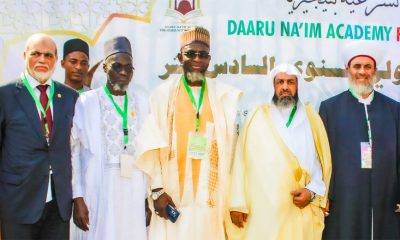
 metro3 days ago
metro3 days ago‘Deepen Shariah knowledge to curb misinformation’
-

 metro2 days ago
metro2 days agoYouths beat Osun monarch for appointing Imam
-

 Business1 day ago
Business1 day agoPetrol price may crash to N500/litre, say marketers
-

 Business1 day ago
Business1 day agoMeta deletes AI accounts after backlash over posts
-
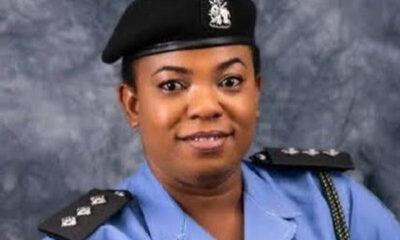
 metro3 days ago
metro3 days agoIlorin: Retired works controller murdered on New Year’s Day
-
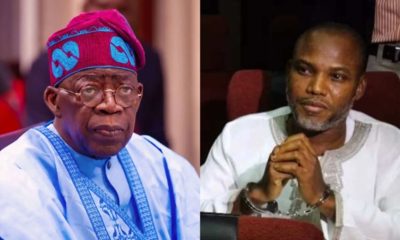
 metro3 days ago
metro3 days agoTinubu’s refusal to honour Seyi’s pact with us disappointing – Nnamdi Kanu’s family
-
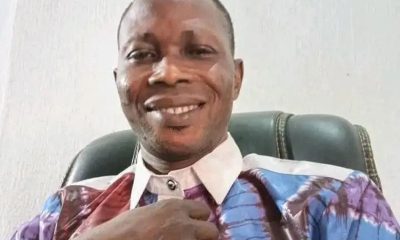
 metro3 days ago
metro3 days agoJealous husband stabs Bishop to death over allege affair with wife
-
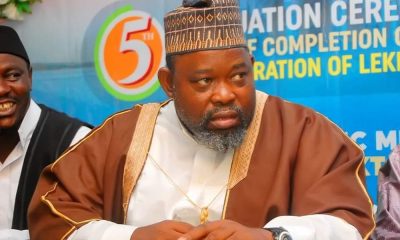
 metro2 days ago
metro2 days agoMosques should be research centres – Varsity don

